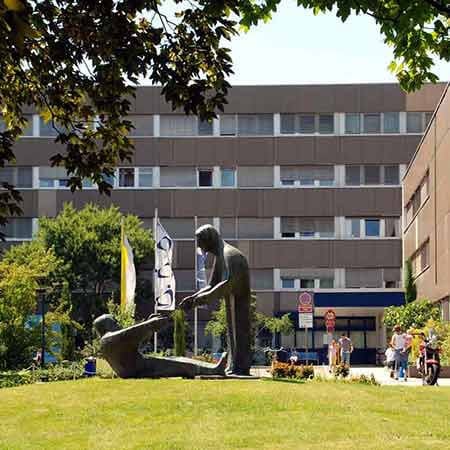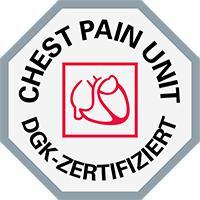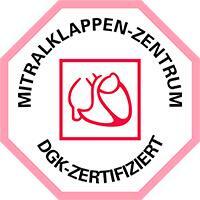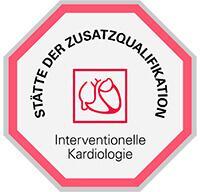Wolff-Parkinson-White syndrome is one of the most common causes of sudden cardiac death in young patients. The disease may not manifest any symptoms for a long time, but periodically leads to attacks of supraventricular tachycardia and atrial fibrillation. In countries with advanced medicine, the disease is successfully treated using minimally invasive interventional procedures. Doctors insert a catheter through the vessels in the leg in order to disrupt the accessory pathways for impulses.
Content
- What is Wolff-Parkinson-White syndrome
- Is Wolff-Parkinson-White syndrome dangerous
- Symptoms
- Diagnostics
- Clinical forms
- Conservative therapy
- Surgical treatment
- Why is it worth undergoing treatment abroad
- Treatment in Europe at an affordable price
What is Wolff-Parkinson-White syndrome
Wolff-Parkinson-White syndrome is an ECG syndrome described by Wolff, Parkinson and White in 1930. This disease is characterized by attacks of tachycardia. The syndrome is diagnosed in about 0.2% of the population. It is the second most common cause of supraventricular tachycardia.
The syndrome is associated with the presence of an additional atrioventricular connection. The pathology is congenital. There has been found a link with the PRKAG2 genetic mutation, but the possibility of inheriting the Wolff-Parkinson-White syndrome has not been proven. However, if a patient has close relatives suffering from this pathology, the risk of its occurrence increases significantly: it reaches 3.4%.
All babies have additional atrioventricular connections at birth, but they are quickly destroyed, so the heart rhythm is not disturbed. This does not happen in the WPW syndrome. An additional pathway for conducting impulses remains in the heart, and therefore tachycardia attacks occur.
Muscle bridges are formed inside the patient's heart. These are pathways for conducting impulses from the atria to the ventricles. They function independently of the atrioventricular connection. These bundles were first described by S. Kent in 1914, and therefore today they are often called bundles of Kent. They are thin filaments of the working atrial myocardium. The width of the bundles differs significantly in different patients: from 0.1 to 7 mm, but on average is 1.3 mm. They are called accessory connections, but not tracts, since they connect the muscular part of the atria to the muscular part of the ventricles without invading the very cardiac conduction system.
Is Wolff-Parkinson-White syndrome dangerous
The syndrome increases the risk of sudden cardiac death. Its lifetime probability is about 4%.
80% of people periodically suffer attacks of tachycardia. 15-30% of patients develop atrial fibrillation. These are the two most common types of arrhythmia associated with WPW syndrome. Most arrhythmias are not life-threatening. However, when atrial fibrillation develops, blood clots can form in the atria, which then lead to thromboembolic complications (for example, stroke). In some patients, arrhythmias develop into ventricular fibrillation, which causes death.
Many patients do not suffer from symptoms. Others do not go to the doctor, as they consider the attacks of the heartbeat not dangerous. As a result, half of patients are diagnosed with Wolff-Parkinson-White syndrome only after the development of atrial fibrillation. At least 12% of cases of sudden cardiac death in Wolff-Parkinson-White syndrome occur in patients who have never suffered from the symptoms of the disease.
Symptoms
The symptoms manifest themselves only during the attacks of heart arrhythmia, while all the rest of the time the pathology is asymptomatic. Some patients with Wolff-Parkinson-White syndrome never experience symptoms during their lifetime.
With the development of an attack of tachycardia, the patient's complaints are as follows:
- Feeling of palpitations.
- Feeling of sinking heart.
- Dizziness.
- Feeling short of breath.
- Pain in the area of the heart.
The attacks start suddenly and end suddenly. They can last only a few seconds or minutes, but in 80% of cases they last several hours. Without medical intervention, some patients may suffer from tachycardia for several days.
An attack can be initiated by physical activity, emotional stress, and alcohol consumption. However, most patients do not associate the onset of tachycardia with any of these factors. As a rule, an attack occurs spontaneously, without triggering factors.
If tachycardia attacks occur, they are more likely to recur. More than half of patients suffer from attacks 1 time per month or more.
Diagnostics
Wolff-Parkinson-White syndrome can be diagnosed with an ECG. The cardiogram detects the characteristic delta waves.
Additional diagnostic tests can be as follows:
- Twenty-four hour Holter monitoring.
- Echocardiography.
- Stress tests.
To assess the risk of sudden cardiac death and the indication for surgery, more accurate studies are required. Doctors use an electrophysiological study. It can be transesophageal or invasive – with cardiac catheterization (intracardiac electrophysiology study).
The electrophysiological study is carried out not for everyone, but only if clinically indicated:
- If surgical or interventional treatment is planned to destroy additional pathways.
- Clinical death or fainting in medical history.
- The presence of symptoms, the origin of which must be determined in order to choose the optimal method of treatment for the disease.
A transesophageal test is non-invasive, but less informative. The direct electrophysiological study is considered the standard option for diagnosing Wolff-Parkinson-White syndrome. Doctors can only insert the catheter into the right chambers of the heart, sometimes also into the left chambers. When using the electrophysiological study, it is possible to establish an accurate diagnosis even in the most difficult cases and to accurately determine the localization of additional pathways for conducting impulses.
Clinical forms
Depending on the clinical course of the pathology, there are four forms of Wolff-Parkinson-White syndrome. These are as follows:
- Manifesting form. The ECG is constantly detecting delta waves. This form of pathology is detected in 0.15-0.2% of the population.
- Intermittent form. It is diagnosed by clinical signs. The signs of ventricular pre-excitation appear and disappear.
- Latent form. Doctors cannot detect any signs of ventricular pre-excitation on the ECG. Nonetheless, conduction disturbances can be initiated by stimulation during the electrophysiological study.
- Hidden form. There are no delta waves on the electrocardiogram. Only atrial pre-excitation develops. Pathology leads to attacks of atrioventricular nodal reentry tachycardia.
Conservative therapy
Conservative treatment of the WPW syndrome is indicated for the relief of an attack of tachycardia. Doctors use both drugs and non-drug methods.
Sometimes the attack can be stopped with non-drug methods:
- Carotid sinus massage.
- Cold-water face immersion.
- Ice pack application.
These manipulations affect the heart by a reflex-mediated mechanism, due to the effect on the vagus nerve. They are most effective immediately after the onset of an attack.
If these manipulations are ineffective, doctors switch to drug therapy. If it does not help, electrical cardioversion becomes an option of choice: an attack of arrhythmia is stopped by applying an electric discharge.
To prevent arrhythmias, conservative therapy is undesirable. The constant use of antiarrhythmic drugs causes side effects. In addition, when treating Wolff-Parkinson-White syndrome:
- It is difficult to predict the response to medication use in the event of tachycardia.
- Some medications increase the patient's heart rate instead of decreasing it.
- Pathology is most often found in children or young people, for whom lifelong use of medicines is unacceptable.
Therefore, the patients with a high risk of sudden cardiac death undergo surgical treatment. This can be an open surgery or an interventional procedure that is performed through the blood vessels. Due to the optimal balance of efficacy and safety, interventional procedures for the treatment of WPW syndrom have practically supplanted drug therapy and open surgery abroad. Interventional treatment has a minimal risk of complications and zero mortality. In most patients, the manifestations of the WPW syndrome disappear. In rare cases, if the procedure is ineffective, it can be repeated.
Surgical treatment
Several types of surgical interventions have been developed for the treatment of Wolff-Parkinson-White syndrom. These are as follows:
- Discrete perinodal cryodestruction of the atrioventricular node.
- Partial surgical isolation of the AV node with its further cryodestruction.
- Laser photoablation of the AV node.
- Open-heart endocardial radiofrequency ablation of accessory pathways.
Today, the main treatment of WPW syndrom is catheter radiofrequency ablation of additional atrioventricular connections. Doctors insert a catheter through an incision in the leg, deliver it to the heart, and damage the bundles of Kent. Modern methods of mapping make it possible to identify them quite accurately. Therefore, in countries with advanced medicine, the effectiveness of the procedure for patients with WPW syndrome exceeds 95%. As a rule, additional pathways for impulses are located along the atrioventricular groove, along the perimeter of the right and left atrioventricular annulus, or in the aortomitral continuity, where the left ventricular myocardium is not in contact with the annulus fibrosus. These areas of the myocardium are damaged, thereby interrupting the conduction of impulses, and the attacks of tachycardia stop.
Radiofrequency ablation is indicated for patients in the following cases:
- Manifestation of symptoms of tachycardia.
- Ineffectiveness of antiarrhythmic therapy, poor tolerance of drug treatment by the patient or unwillingness to continue long-term therapy.
- Atrial fibrillation.
- Cardiac arrest in the medical history.
- Family history of sudden cardiac death.
The radiofrequency ablation procedure is required not only for the elimination of symptoms, but also for the prevention of sudden cardiac death. The risk of its development in Wolff-Parkinson syndrome is 0.15% for 3 years and 0.4% for 10 years. On average, the risk in the population is low, but it increases with the following circumstances:
- Shortened R-R interval on the cardiogram (up to 0.25 s) during spontaneous or induced atrial fibrillation.
- Familial form of Wolff-Parkinson-White syndrome.
- Ebstein's anomaly (congenital heart disease).
- Large number of additional pathways.
The patient's profession also influences the decision on the need for radiofrequency ablation. In some cases, even a minimal risk of severe arrhythmias, fainting, or sudden cardiac death is the reason for the procedure. It is indicated to pilots, military personnel, athletes, and police officers. That is, it is needed in situations where an arrhythmia attack can lead to serious consequences for the patient himself and the people around him.
Radiofrequency ablation restores normal impulse conduction. Arrhythmia attacks stop completely. Patients no longer suffer from symptoms. The risk of sudden cardiac death becomes the same as the average in the population, that is, as in people who have never had additional pathways for conducting impulses in the heart.
Why is it worth undergoing treatment abroad
You can undergo treatment in one of the countries offering advanced medicine. In this case, you can be sure that you are being treated with modern but not outdated methods. You will get the best results with minimal health risks.
There are several reasons for you to undergo treatment of Wolff-Parkinson-White syndrom abroad:
- Highly accurate diagnostics: doctors will determine if you need treatment to prevent arrhythmias.
- Safe relief of attacks of tachycardia and ventricular fibrillation.
- The main treatment of WPW syndrom is minimally invasive radiofrequency ablation. The procedure is performed without incisions on the thorax.
- The effectiveness of interventional treatment in the best hospitals exceeds 95%.
- The risk of complications is less than 1%.
- Patient mortality rates are practically zero.
- Successful treatment of Wolff-Parkinson-White syndrom combined with congenital heart diseases.
- Possibility of minimally invasive treatment of pathology at any age, including children.
Treatment in Europe at an affordable price
To undergo treatment in one of the European hospitals, please use the services of the Booking Health company. On our website, you can find out the cost of treatment in Europe and compare prices in order to book a medical care program at a favorable price. The treatment in Europe will be easier and faster for you, and the cost of treatment will be lower.
You are welcome to leave your request on the Booking Health website. Our specialist will contact you and provide a free consultation on medical treatment in Europe. Booking Health will take care of the organization of your trip abroad. We will provide the following benefits for you:
- We will select a hospital for treatment in Europe, whose doctors specialize in the treatment of Wolff-Parkinson-White syndrome and achieve the best results.
- We will solve the problem of the language barrier, and we will help to establish communication with your attending physician.
- We will reduce the waiting time for the medical care program. You will undergo treatment on the most suitable dates.
- We will reduce the price. The cost of treatment in a European hospital will be lower due to the lack of overpricing and additional coefficients for foreign patients.
- We will help you to solve any organizational issues: we will draw up documents, meet you abroad and take you to the hospital, book a hotel, and provide interpreting services.
- We will prepare a program and translate medical documents. You will not need to repeat the previously performed diagnostic procedures.
- We will help you keep in touch with the hospital after treatment in Europe.
- We will arrange additional diagnostic examinations and treatment in a European hospital, if required.
- We will buy medicines in another country and forward them to your native country.
The world's leading doctors will take care of your health. The Booking Health specialists will help reduce the cost of treatment, organize your trip, and you can fully focus on restoring your health.
Authors:
This article was edited by medical experts, board-certified doctors Dr. Nadezhda Ivanisova, and Dr. Bohdan Mykhalniuk. For the treatment of the conditions referred to in the article, you must consult a doctor; the information in the article is not intended for self-medication!
Our editorial policy, which details our commitment to accuracy and transparency, is available here. Click this link to review our policies.


















